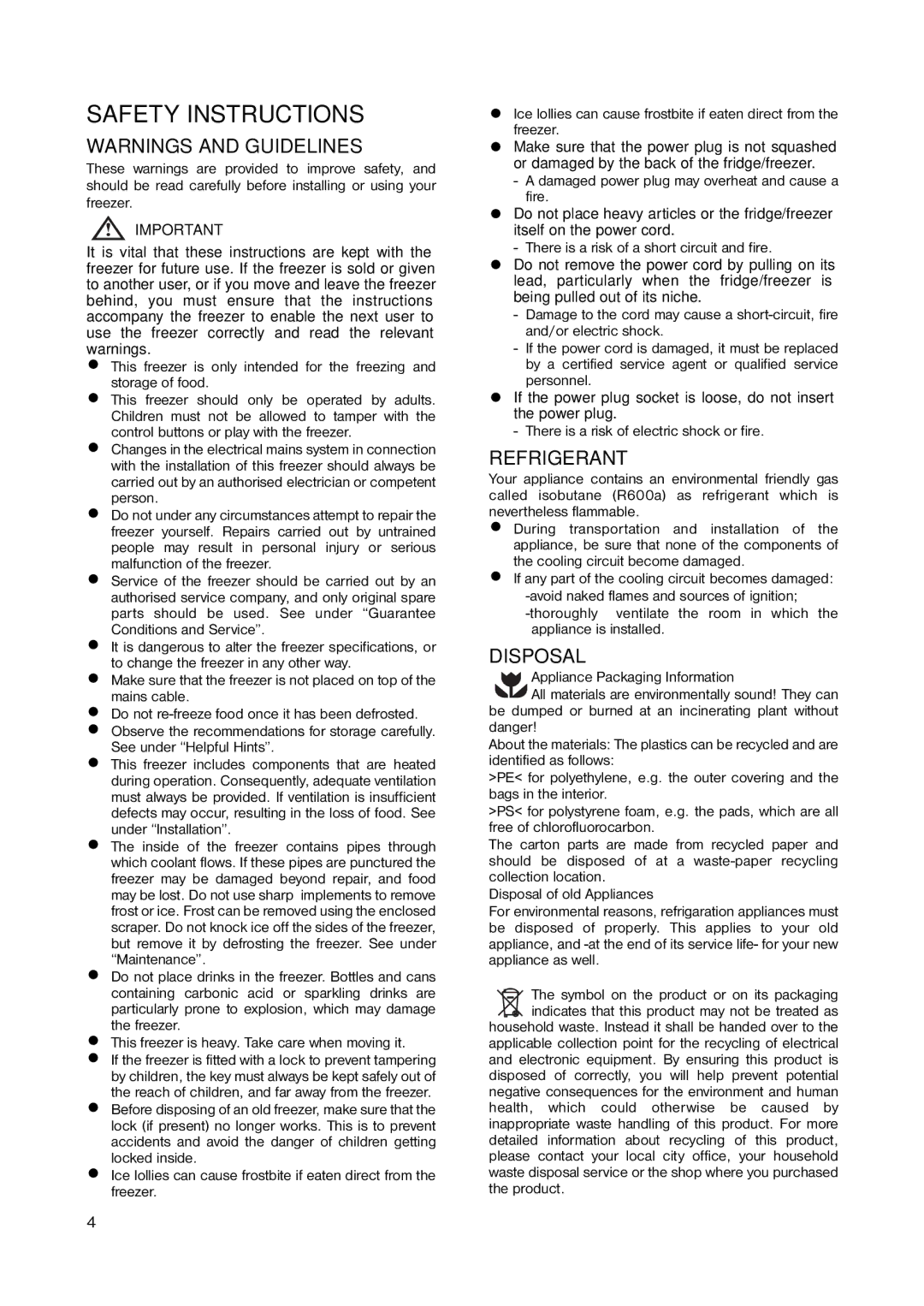
SAFETY INSTRUCTIONS
WARNINGS AND GUIDELINES
These warnings are provided to improve safety, and should be read carefully before installing or using your freezer.
IMPORTANT
It is vital that these instructions are kept with the freezer for future use. If the freezer is sold or given to another user, or if you move and leave the freezer behind, you must ensure that the instructions accompany the freezer to enable the next user to use the freezer correctly and read the relevant warnings.
This freezer is only intended for the freezing and storage of food.
This freezer should only be operated by adults. Children must not be allowed to tamper with the control buttons or play with the freezer.
Changes in the electrical mains system in connection with the installation of this freezer should always be carried out by an authorised electrician or competent person.
Do not under any circumstances attempt to repair the freezer yourself. Repairs carried out by untrained people may result in personal injury or serious malfunction of the freezer.
Service of the freezer should be carried out by an authorised service company, and only original spare parts should be used. See under “Guarantee Conditions and Service”.
It is dangerous to alter the freezer specifications, or to change the freezer in any other way.
Make sure that the freezer is not placed on top of the mains cable.
Do not
This freezer includes components that are heated during operation. Consequently, adequate ventilation must always be provided. If ventilation is insufficient defects may occur, resulting in the loss of food. See under “Installation”.
The inside of the freezer contains pipes through which coolant flows. If these pipes are punctured the freezer may be damaged beyond repair, and food may be lost. Do not use sharp implements to remove frost or ice. Frost can be removed using the enclosed scraper. Do not knock ice off the sides of the freezer, but remove it by defrosting the freezer. See under “Maintenance”.
Do not place drinks in the freezer. Bottles and cans containing carbonic acid or sparkling drinks are particularly prone to explosion, which may damage the freezer.
This freezer is heavy. Take care when moving it.
If the freezer is fitted with a lock to prevent tampering by children, the key must always be kept safely out of the reach of children, and far away from the freezer. Before disposing of an old freezer, make sure that the lock (if present) no longer works. This is to prevent accidents and avoid the danger of children getting locked inside.
Ice lollies can cause frostbite if eaten direct from the freezer.
Ice lollies can cause frostbite if eaten direct from the freezer.
Make sure that the power plug is not squashed or damaged by the back of the fridge/freezer.
-A damaged power plug may overheat and cause a fire.
Do not place heavy articles or the fridge/freezer itself on the power cord.
- There is a risk of a short circuit and fire.
Do not remove the power cord by pulling on its lead, particularly when the fridge/freezer is being pulled out of its niche.
-Damage to the cord may cause a
-If the power cord is damaged, it must be replaced by a certified service agent or qualified service personnel.
If the power plug socket is loose, do not insert the power plug.
- There is a risk of electric shock or fire.
REFRIGERANT
Your appliance contains an environmental friendly gas called isobutane (R600a) as refrigerant which is nevertheless flammable.
During transportation and installation of the appliance, be sure that none of the components of the cooling circuit become damaged.
If any part of the cooling circuit becomes damaged:
DISPOSAL
Appliance Packaging Information
All materials are environmentally sound! They can be dumped or burned at an incinerating plant without danger!
About the materials: The plastics can be recycled and are identified as follows:
>PE< for polyethylene, e.g. the outer covering and the bags in the interior.
>PS< for polystyrene foam, e.g. the pads, which are all free of chlorofluorocarbon.
The carton parts are made from recycled paper and should be disposed of at a
Disposal of old Appliances
For environmental reasons, refrigaration appliances must be disposed of properly. This applies to your old appliance, and
![]()
![]() The symbol on the product or on its packaging
The symbol on the product or on its packaging ![]() indicates that this product may not be treated as household waste. Instead it shall be handed over to the applicable collection point for the recycling of electrical and electronic equipment. By ensuring this product is disposed of correctly, you will help prevent potential negative consequences for the environment and human health, which could otherwise be caused by inappropriate waste handling of this product. For more detailed information about recycling of this product, please contact your local city office, your household waste disposal service or the shop where you purchased
indicates that this product may not be treated as household waste. Instead it shall be handed over to the applicable collection point for the recycling of electrical and electronic equipment. By ensuring this product is disposed of correctly, you will help prevent potential negative consequences for the environment and human health, which could otherwise be caused by inappropriate waste handling of this product. For more detailed information about recycling of this product, please contact your local city office, your household waste disposal service or the shop where you purchased
the product.
4
